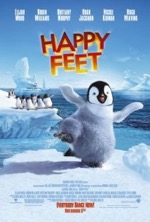Happy Feet (PG)

Starring: Elijah Wood
November 2006
“Heavy-Handed Politics Leaves ‘Feet’ Flatfooted”
The last time I saw an animated movie this political was FernGully: The Last Rainforest (1992). An indoctrination session for the New Age movement, the movie extols the mystical energies that govern the “circle of life,” while vilifying the humans responsible for deforestation and upsetting nature’s delicate balance. On the face of it, Happy Feet is a seemingly innocent, completely innocuous animated film, whose only apparent pretension is that it comes too soon on the heels of 2005’s surprise hit documentary, March of the Penguins—but as we all know, appearances can be deceiving. For anyone who’s seen March of the Penguins, the opening chapter of Happy Feet will feel like a prolonged bought of déjà vu, complete with plagiarized narrations and scenes that look like they were lifted right out of the documentary.
Early on, the movie focuses on Mumble’s (Elijah Wood) desperate attempts to fit in with his peers; Mumble can tap-dance like Fred Astaire, but his singing resembles a blaring foghorn. One adult penguin, who looks down on the misfit youth, charges, “A penguin without a heart song is no penguin at all.” Excluded from many normal activities—much like that famous reindeer we’ve all sung about—Mumble often steals away to a nearby glacier and tap-dances by himself, away from disapproving eyes.
Somewhere along the way, the movie’s depiction of an outsider with abnormal development becomes a thinly veiled reference to homosexuality. The scene where this becomes painfully obvious is when Mumble teaches his peers how to tap-dance; the old guard vehemently opposes the new form of artistry, viewing it as an uprising, an aberration and a pagan display. When Mumble’s father implores his son to desist with his peculiar dancing, Mumble replies, “Don’t ask me to change, pa’, because I can’t.” With that, Mumble is banished from the penguin community.
A short time later, mumble is befriended by a quintet of diminutive, Latin-speaking penguins; awed by Mumble’s skillful dancing they welcome him into their group with open flippers. (As a pertinent aside, George Lucas was widely criticized for creating aliens with Asian accents in Star Wars: Episode I, but in Happy Feet, where ethnic speech stands out like Mumble’s blue eyes, no one, especially the liberal left—to whom the film heavily panders, has said a word about the obvious racial stereotyping.) Mumble and the Latin penguin entourage team up with Lovelace (Robin Williams), a kind of charismatic prophet who wears a plastic six-pack holder as a necklace.
As the ragtag group goes in search of “aliens”—the mysterious beings who gave Lovelace his necklace—they soon discover huge warehouses, docks, heavy equipment and colossal fishing boats. It’s at this point when humans are revealed as not only the aliens, but also as the villains of the movie; apparently humans have been stealing scores of fish from local waters and leaving the penguins with empty stomachs. Captured and imprisoned in an arctic exhibit, Mumble makes repeated attempts at communicating with his human captors, but his animal vocalizations fall on uncomprehending ears, “Why are you taking our fish? You’re kind of killing us out there!”
In order to keep from going crazy, Mumble learns to entertain spectators with his fancy footwork, which immediately draws the attention of the scientific community. Mumble is implanted with a tracking device and released from captivity: A film crew follows Mumble back to his home and captures footage of the penguins dancing in Mumble’s soulful style. Once assembled and released, the documentary creates a political and public outcry which leads to a moratorium being placed on fishing in the waters near Mumble’s glacier. The movie’s final shot tracks a penguin feather as it’s carried along by the wind in a gliding, meandering course, much like Robert Zemeckis’ free-flowing feather at the conclusion of Forrest Gump. Coincidence? I don’t think so!
Where Forrest Gump is existential, Happy Feet is environmental. In fact, the movie’s political slant is so transparent and so in-your-face, it’s almost nauseating. How cowardly of leftist Hollywood and environmentalist wackos to use an animated film to espouse, disseminate and otherwise foist their alarmist and fear-mongering doctrine upon audiences; offending many adults and unduly influencing the minds of future generations with a “green” theology.
The localized and oversimplified climax is utterly laughable…one dancing penguin can save the planet? One colony of dancing penguins can change international policy? I’m sure even older children can discern that they’re being sold a load of penguin droppings. And it’s really children who are loosing out the most here; for their sake, why can’t Hollywood check its politics at the door and let kids make up their own minds about where they stand on environmental issues…when they’re old enough to do so?
The real tragedy with Happy Feet is that, politics aside, the film is a visual marvel—the next evolutionary leap in CGI. The leopard seal chase is an exhilarating thrill ride of evasive maneuvers and narrow escapes and the killer whale sequences are absolutely breathtaking. Also, the movie’s vocal talents are stellar, though it seems as if every other character is voiced by Robin Williams, and that gets a tad tedious.
Happy Feet would’ve been so much better had it simply concentrated on being an animated kid’s film and not on being a stilted soapbox lecture on global correctness; the heavy-handed sermonizing severely detracts from what otherwise would have been a highly entertaining family film. So, as Mumble would say, I appeal to Hollywood’s better nature and officially request that they refrain from producing films, especially animated ones, which are nothing more than a political platform for some special interest group to use in propagating their misguided message to a mass audience. Just as there’s a separation of church and state, I propose a separation of politics and media. It probably would never work, but what the heck, we might just get objective news out of the deal.
Rating: 2